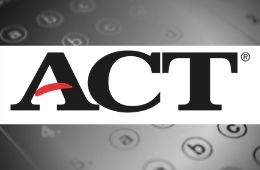
The dates are set for Knox County’s sophomores and juniors to take the ACT exam.
Test Dates
- Juniors will test on Tuesday, March 10, 2020
- Sophomores will test on Tuesday, March 24, 2020
Why We Give the ACT (State Mandate)
Senate Bill 1, 2017, mandates that grade 10 and 11 students take a college admissions examination. The Kentucky Department of Education funds the junior assessment and the Knox County Public Schools fund the sophomore assessment.
KDE’s primary use of the college admissions exam is to measure students’ level of readiness for college in core academic content areas. Meeting benchmarks on the ACT is one way students may demonstrate academic readiness in the Transition Readiness indicator of the state’s accountability system for schools.
Why We Give the ACT (Student Benefits)
Beyond the state use of results, the state-administered college admissions exam also benefits students, their parents and educators in several ways. Administering the college admissions exam as part of required state testing permits students to take the exam at no cost to them. The exam is administered during the school day, providing equitable access for all students to participate. Additionally, many organizations that offer merit or academic scholarships will identify and award financial assistance based on scores from a college admissions exam.
Interested in taking dual credit classes as a junior or senior? Taking the ACT exam will help you determine whether you meet acceptance benchmarks to enroll in the courses and will help you target areas that you may need to study for or seek tutoring for.
Sophomores, interested in being part of Governor’s Scholars during your junior to senior year? Like determining acceptance into dual credit, by taking the ACT as a sophomore you will have ample time to work towards increasing your score that will be reported to GSP.
What Is Assessed on the ACT?
The program consists of four major components:
Tests of Educational Development
The multiple-choice tests cover four skill areas: English, mathematics, reading and science. The tests emphasize reasoning, analysis, problem solving, and the integration of learning from various sources, as well as the application of these proficiencies to the kinds of tasks that college students are expected to perform.
Course/Grade Information Section
This component provides 30 self-reported high school grades in English, mathematics, natural sciences, social studies, language, and the arts. The courses include those that customarily form the core of a college preparatory curriculum and are frequently required for admission to college.
Student Profile Section (SPS)
The SPS contains information reported by students, in such categories as educational plans, interests, and needs, financial aid, and demographic background information.
The ACT Interest Inventory
This 72-item survey reports scores that parallel six interest and occupational types, helping students identify majors consistent with their interests.
How Can I Study for the ACT?
ACT Academy
ACT provides a free resource available to all students, parents, teachers, principals, and other educators. ACT Academy is an online learning tool that provides personalized, free resources unique to student learning gaps and aligned to the ACT reporting categories. ACT Academy is a collection of K-12 videos, games, quizzes, and interactives from publishers such as Flocabulary, NASA, Crash Course, GeoGebra, PBS, and tens of thousands of others that students can access via any computer, tablet, Chromebook, or even their smartphones.
Google recently announced that by searching for “ACT” in the search engine it will deliver customized results for practice tests, upcoming test dates, and more.
